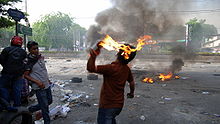 At OurAirports, an anonymous visitor has left the same comment for six different Vietnamese airports (including an air force base), encouraging a Libyan-style uprising in Vietnam (the comments should be gone by the time you read this, for reasons that will become clear below). According to Google translate, each comment begins something like this:
At OurAirports, an anonymous visitor has left the same comment for six different Vietnamese airports (including an air force base), encouraging a Libyan-style uprising in Vietnam (the comments should be gone by the time you read this, for reasons that will become clear below). According to Google translate, each comment begins something like this:
Other ways to protest that a person can do.
Libyan people using violence to overcome violence, ONLY NEW VIOLENCE AGAINST THE VIOLENCE.
Please all the people of Vietnam Hero follow Libyan people:
Gasoline burn all government buildings, the gas plants, the tank cars carrying fuel, the homes of Communist Party members Hunting Dogs.
Each comment then goes on to provide detailed instructions with different ways of making and using Molotov cocktails. My approach to comment moderation on OurAirports is fairly permissive — I’m happy to leave in comments with strong language, political views, or even scammers trying to defend themselves (it’s fun to see other commenters take them down). I will not, however, allow comments encouraging violence, and even more importantly, I won’t allow comments that include weapon-making instructions.
In a wonderful bit of unintended irony, each comment ends like this:
The U.S. government declared, would send U.S. troops to guard the people’s protests, the people in countries with rebel demands to overthrow dictatorships.
The United States — saviour of the Vietnamese people?

You are of course entitled to filter comments however you see fit on your web site. However …
“The United States — saviour of the Vietnamese people?”
It sounds ironic, but it really isn’t. The US fought to help a democratic nation filled with real live vietnamese people from communist invasion. The fight was not successful, and resulted in a lot of suffering for the subjected people and a lot of death nearby (ask Aviatrix). So, can we agree at least to “attempted saviour”?
And regarding weapons, effective self-defense against armed opponents requires weapons. There is not much point making some sort of moral judgment about weapons per se, as opposed to their employment in particular circumstances.
Re. South Vietnam, I was mistaken to label it as “democratic” at the time of US involvement. It was a troubled country with a troubled government. But it was still an ally and a victim.
Thanks, Frank — you saved me the correction. South Vietnam was a dictatorship that (especially under Diem and his massacres) made Egypt and Libya look like Switzerland — not that the North was a paradise, either, of course.
The Vietnam War had two components: a conventional military invasion from the North (the North Vietnamese army), and a guerilla anti-government insurgency in the South (Viet Cong). The US intervention, whether justified or not, left 60,000 American soldiers and somewhere between 200,000 and 2M Southeast Asian civilians dead, a tragedy of mind-numbing proportions for the region — imagine 100 to 1,000 consecutive 9/11 attacks, in an area with a fraction of the US population.
Most Vietnamese alive today were born after the war, and I suspect the person who posted that comment must be among the young. It’s hard to imagine anyone who actually lived through the war — no matter what side he or she supported then, and no matter how much he or she likes the US now — wanting to see American solidiers back in Vietnam. The memories would just be too painful.
“The US intervention, whether justified or not,..”
But isn’t that *the* key question in assigning blame for the deaths?
Just one more tidbit. US Navy visits Vietnam, 2009
I served during the Vietnam War and EVERY war leaves a lot of innocents dead, and rarely has the result desired.
I doubt the US military can save many people, let alone a country.
@JetAviator7, when you “doubt”, are you talking about the present or the past?
There are many wars where people and countries were saved by the US military and its allies. A few world wars come to mind immediately, but many other smaller conflicts probably also qualify, unless you define “saved” way down.
As for now, who knows? The present wars have liberated millions from dictatorships; the question is whether it can last, whether the people can stay saved.